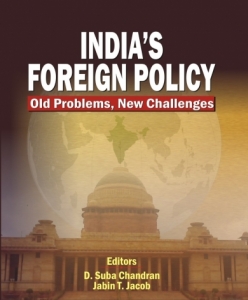India’s rise constitutes, along with China’s ascension, one of the most fascinating and important stories of the past two decades, and it is certain to contribute to a fundamental shift of power towards Asia for years to come. Yet while many international analysts acknowledge India’s newfound importance, a lot of the analysis focuses India- Pakistan relations, often written by US-based experts with a very specific set of interests and perspectives. Pakistan is only one of the countless challenges Indian foreign policy makers face – in fact, every single bilateral relationship, be it with Bangladesh, Nepal, China or Sri Lanka, presents its very unique obstacles, fundamentally shaping India’s foreign policy outlook.
It is in this context that “India’s Foreign Policy: Old Problems, New Challenges”, edited by D. Subra Chandran and Jabin T. Jacob, is a most welcome contribution, presenting an interesting perspective from India’s new generation of foreign policy researchers. In a  country where former generals and ambassadors often dominate the (vivid) foreign policy debate, this new addition is certain to enliven it even further. While most contributors have traveled widely, most of them have completed their postgraduate education in India (the majority at Jawaharlal Nehru University, one of the country’s prime institutions for the studies of IR), thus conveying a distinctly local point of view. In addition, the book presents a stimulating mix of analysis and policy recommendation on how to tackle problems that have, in some cases, persisted over fifty years.
country where former generals and ambassadors often dominate the (vivid) foreign policy debate, this new addition is certain to enliven it even further. While most contributors have traveled widely, most of them have completed their postgraduate education in India (the majority at Jawaharlal Nehru University, one of the country’s prime institutions for the studies of IR), thus conveying a distinctly local point of view. In addition, the book presents a stimulating mix of analysis and policy recommendation on how to tackle problems that have, in some cases, persisted over fifty years.
As becomes very clear in Jabin’s introduction, the very diverse set of challenges confronting India in its region make it very difficult for India to adopt overall consistent, universal strategies – rather, it is forced to act on a case-by-case basis with its neighbors, which significantly reduces its ability to focus on global challenges. Kumar Singh’s Chapter 2 on Sino-India ties provides interesting insights, but the reader is left guessing whether the author believes Asia is big enough for two world powers of comparable strength, or whether one will seek to impose itself. In Chapter 3, Murthy shows that India’s policy towards Nepal has often been clumsy, pointing to the difficulties of dealing with countries whose domestic politics is marked by volatility and conflict. In Chapter 4, Singh goes beyond common wisdom by questioning whether China’s growing influence over Myanmar is really a zero-sum game for India. In Chapter 5, Bhardwaj exposes Indian and Bangladeshi ineptitude at finding together despite no apparent roadblock, and he urges the Indian government to adopt a more accommodating strategy. It is in chapter 6 (on India-Sri Lanka relations), 7 (Pakistan) and 8 (regarding Afghanistan) that it becomes clear how essential a pro-active Indian regional strategy is to stabilize the region. In Chapter 8 Sharma neatly shows how terrorism, drug trafficking and energy needs turn Afghanistan into a key country for India, but his recommendation that India should engage in institution building seems difficult to implement in a country where, as he rightly notes, basic security is lacking. Chapter 9 on India-US ties defines military cooperation and climate change as two key issues, noting that the United States remain a key actor in the regional context. The essay on India-Africa relations (Chapter 10) points to competition between China and India, but fails to address the tension of developing country identity and donor country India experiences. In Chapter 11, about ties with West Asia (Iran, Israel and the Arab World), the reader can appreciate how much energy security shapes India’s foreign policy outlook, limiting its scope of action. The same is true for India-Central Asia Relations (Chapter 12), in which Sharma notes that India will soon have to import over 80% of its energy.
Part II of the book offers interesting insights into themes such as terrorism, failed states, and border conflicts. Jabin clearly defines those as priorities in Chapter 20 when arguing that the government “must realize that India simply cannot leapfrog problems in its vicinity and onto the world stage.” One of the key recommendations the final chapter offers is to radically promote economic integration between India and its neighbors in the hope that this would reduce decades of mistrust.
The emergence of China is, interestingly enough, a key theme that receives mention in almost every single chapter, offering fascinating proof of how strongly India’s largest neighbor’s rise pervades every aspect of India’s foreign policy making – be it bilateral ties with Pakistan, Myanmar or Nepal. It shows that India’s new generation of researchers has identified the rise of China as India’s key challenge, marking a difference from established thinkers who often lay an emphasis on the conflict with Pakistan.
Finally, compared to traditional political analysis by established thinkers, these young researchers show no hesitation to accept that India is bound to turn into a key actor on the international stage in the decades to come – and that current challenges pale against the foreign policy controversies India will be exposed to once it assumes a truly global role.
Read also:
Book review: “The First Great Realist: Kautilya and his Arthashastra” by Roger Boesche








